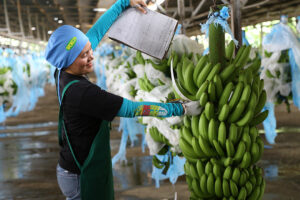PHL losing share in key banana markets due to pests, diseases
DAVAO CITY — Pilipino Banana Growers and Exporters Association (PBGEA) Executive Director Stephen Antig said the Philippines is losing key markets for bananas due to weak production as a result of pests and diseases, specifically fusarium wilt or Panama disease. Mr. Antig said Philippine market share for fresh banana has fallen steadily since 2012. In […]

DAVAO CITY — Pilipino Banana Growers and Exporters Association (PBGEA) Executive Director Stephen Antig said the Philippines is losing key markets for bananas due to weak production as a result of pests and diseases, specifically fusarium wilt or Panama disease.
Mr. Antig said Philippine market share for fresh banana has fallen steadily since 2012. In Japan, the Philippines used to have a 94% share of the market share; in 2023, it was 79%.
The industry’s main market, China, was at 40% market share last year, from 82% in 2012. South Korean market share was 69% in 2023 from 98% previously. Market share in the United Arab Emirates was down to 8% in 2023 from 83% in 2012.
“We simply don’t have the volume due to devastation brought about by pests and diseases,” he said during the Business Matters media briefing at Hukad, Ayala Malls Abreeza.
According to Mr. Antig, it’s not easy to replace areas with banana plantations affected by fusarium wilt or expand acreage because of the Agrarian Reform Law, which limits landowners to five hectares.
“It’s not a demand problem but a supply problem because we have been infested with fusarium diseases and climate change and the problem of getting additional hectarage for expansion purposes and to replace those areas affected by pests and diseases,” he said.
He said in Cambodia, a single banana plantation can be as large as 20,000 hectares.
He also said Mindanao land planted to banana is down to 51,000 hectares from 89,000 hectares before the disease hit.
Mr. Antig said PBGEA has been lobbying the Department of Agrarian Reform to amend the Agrarian Reform Law because the five hectare limits is not suitable for efficient growing.
“Unfortunately, we have not gotten any feedback as to whether the amendments are happening or not. We will continue to lobby otherwise there will come a time when Mindanao will no longer be known as the banana republic,” he said.
Mr. Antig said banana growers must content themselves with rehabilitating the areas affected by pests and diseases.
“But we cannot do that as fast as we want to because it will take from nine months to one year for bananas to bear fruit. The spread of fusarium wilt is faster,” he said.
He said the industry is trying to develop a new variety of banana that is resistant to most pests and diseases.
“We are racing against time because if we do not identify a new variety, it is possible that the remaining 51,000 hectares will also be affected, and what will happen to individuals dependent on this industry?… the banana industry contributed not only to the economic development of Mindanao, but to improving peace and order by providing employment,” he said.
Mr. Antig said PBGEA is drafting a bill on the revitalization of the banana industry, which it hopes to pass on to a legislator to sponsor in Congress.
“One of the stipulations of the bill is to establish a world-class research facility that will not only serve the Cavendish industry but the entire agriculture sector. We are not giving up hope as a lot of people are dependent on the industry,” he said. — Maya M. Padillo














